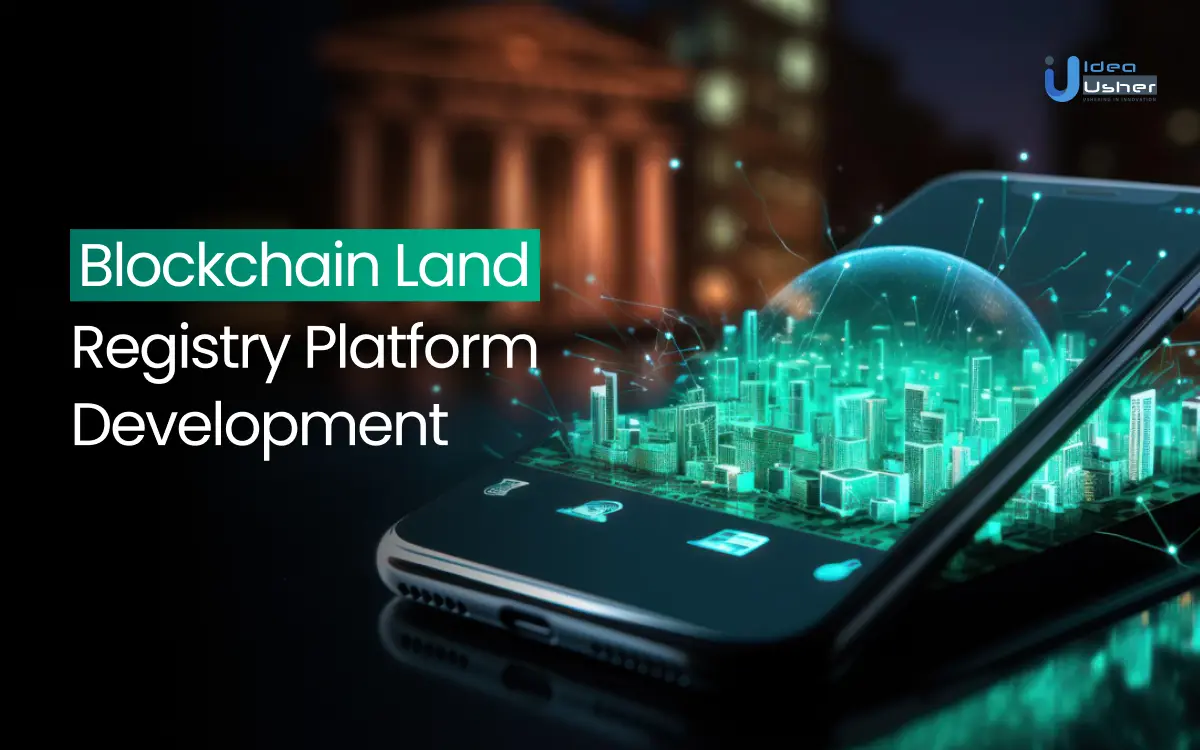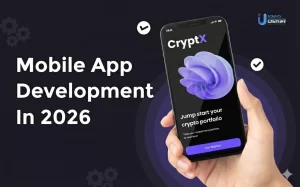Land ownership has relied on paper trails and centralized databases for centuries. However, these traditional systems are susceptible to fraud, errors, and inefficiency. The recent growth of blockchain technology offers a transformative solution: blockchain land registry platforms.
This blog delves into the exciting world of blockchain land registries.
In this blog We’ll explore how this innovative approach streamlines land ownership, enhances security, and fosters transparency in property transactions. Get ready to discover blockchain’s potential to revolutionize land rights management!
What is the Blockchain Land Registry Platform?
Traditional land registries, reliant on paper trails and centralized databases, are vulnerable to errors, fraud, and inefficiency. Blockchain technology offers a groundbreaking solution: blockchain land registry platforms. These platforms leverage blockchain’s potential to create a secure and transparent system for land registration.
This innovative approach boasts a multitude of advantages. A core feature is the use of an immutable and decentralized public ledger. This ensures the accuracy and security of land records by making them tamper-proof and readily accessible to authorized users. Furthermore, blockchain streamlines the process by eliminating the need for middlemen, leading to faster validation, reduced costs, and shorter registration times.
Additionally, the technology hinders fraudulent activity and facilitates secure ownership transfers through cryptography and smart contracts. By creating digital titles and maintaining a transparent and secure system for data tracking, blockchain land registry platforms represent a significant leap forward in modernizing and securing land ownership processes.
How Does a Blockchain-Enabled Land Registry Platform Work?
Here’s how a Block land registry platform works,
Stakeholders in the Ecosystem:
- Buyers:
- Search property listings
- Verify ownership history
- Securely interact with sellers
- Utilize digital wallets for transactions
- Leverage geospatial data and tokenized attributes for search
- Sellers:
- Manage property listings
- Control access through smart contracts
- Upload land parcel data in standardized formats (potentially integrating with existing GIS systems)
- Land Inspectors:
- Utilize digital signatures for document verification
- Approve transactions
- Maintain data integrity with role-based permissions
A Step-by-Step Breakdown:
1. User Registration:
- KYC (Know Your Customer) Compliance: Users undergo verification processes to comply with Anti-Money Laundering regulations. Hashed KYC data is stored on the blockchain using secure algorithms, ensuring privacy and authenticity.
- Digital Identities: Public-key cryptography establishes unique user identities. Public keys are used for verification, while private keys held securely by users are essential for signing transactions.
Real-World Example: A project in Honduras aims to create a transparent land registry for communities facing land disputes. KYC procedures ensure a reliable record of ownership.
2. Uploading Property Specifications:
- Land Parcel Tokens: Each land parcel is represented by a unique token on the blockchain, simplifying ownership tracking and facilitating secure transfers. Standards like ERC-721 can define property characteristics and ownership rights.
- Document Uploads and Timestamping: Property documents are uploaded in tamper-proof formats with digital signatures. Blockchain timestamps provide immutable proof of document creation and any subsequent modifications.
3. Buyers Request Access to Listed Property:
- Secure Communication Channels: End-to-end encryption protocols like TLS/SSL ensure secure communication between buyers and sellers.
- Smart Contract-based Access Control: Predefined conditions within smart contracts govern data visibility. Buyers might need to fulfill specific criteria (e.g., proof of funds) before accessing detailed property information.
4. Seller Approves Transfer and Land Inspector Receives Notification:
- Smart Contract Triggers: Smart contracts are triggered upon seller approval to grant land inspectors access to property documents for verification. These self-executing contracts automate specific actions based on predefined conditions, streamlining the transfer process.
5. Land Inspector Verification and Transfer Initiation:
- Document Verification: Land inspectors leverage digital signatures and cryptographic hashing to verify document authenticity and prevent forgeries.
- Secure Meeting Scheduling: The platform can facilitate secure video conferencing for ownership transfer meetings, with recordings immutably stored on the blockchain for future reference.
- Transaction Initiation: Smart contracts are triggered to initiate the transfer process once verification is complete. This might involve:
- Secure transfer of funds using integrated cryptocurrency wallets or fiat on-ramps.
- Automatic update of land ownership records on the blockchain, reflecting the new owner.
Case Study: Georgia successfully piloted a blockchain-based land titling system. Smart contracts automated property transfer processes, reducing bureaucratic hurdles and transaction times.
6. Land Registry Document Validation and Authenticity:
- Off-Chain Dispute Resolution: In case of disputes, authorized parties can upload signed land registry documents for validation. The platform recalculates the document hash and compares it to the original hash stored on the blockchain. A match confirms document authenticity and prevents tampering.
Key Takeaways for Blockchain in Land Registry
Source: MarketResearchIntellect
Some countries, like Sweden, Ukraine, and Georgia, have already begun using blockchain for land registration. In Georgia, for instance, using blockchain has reduced the sale process time from days to minutes and operational costs by up to 90%. The global Blockchain for Land Registry & Asset Tracking market size is expected to reach a significant value by 2028, growing at a steady CAGR over the analysis period 2022-2028.
Challenges in the Existing USA Land Registry System and How Blockchain Can Revolutionize It?
While established, the traditional US land registry system struggles with several significant limitations that create frustration and inefficiency for landowners, buyers, and government agencies alike. Here’s a closer look at some of the key challenges:
1. The Involvement of Middlemen and Brokers:
A 2023 report by the National Association of Realtors (NAR) found that realtor fees in the US average around 5-6% of the sale price, translating to thousands of dollars on a typical home sale. While brokers offer valuable expertise, their involvement adds extra cost and complexity.
With its high-volume real estate market (estimated at $1.7 trillion in sales in 2022), the US’s real estate costs are substantial. Blockchain land registry platforms can leverage smart contracts to automate tasks currently handled by middlemen, such as verifying ownership and facilitating secure transactions. This can significantly reduce transaction fees and simplify the process for all parties involved.
2. The Increasing Number of Fraud Cases
The US HUD estimates that a staggering 1 in 50 property titles contain errors. These errors and vulnerabilities in traditional paper-based record-keeping systems create openings for fraud. A recent high-profile case in Miami involved a $3 million property fraudulently sold due to weaknesses in the current system.
Blockchain’s core strength lies in its immutability. All transactions are securely recorded on a tamper-proof, distributed ledger using cryptography. This makes it virtually impossible to forge documents or manipulate ownership records. Additionally, some blockchain platforms utilize public ledgers, allowing for increased public scrutiny of land records and further enhancing trust in the system.
3. Time Delays:
The current system can be sluggish, with title registrations sometimes taking months to complete. A recent study by Freddie Mac found that the average closing time for a home sale in the US is 49 days. This delay creates uncertainty and can hold up entire transactions. Blockchain technology can accelerate the process significantly. Automated smart contracts can streamline ownership transfers by automatically executing predefined conditions upon fulfillment. This could potentially reduce closing times from weeks to days.
5. Human Error/Intervention:
Manual data entry in traditional land registries is prone to human error, leading to inconsistencies, delays, and even legal disputes. A 2022 report by the Government Accountability Office (GAO) found that errors in federal land management records cost taxpayers millions of dollars. Blockchain eliminates the need for manual data manipulation. Every transaction is cryptographically verified and added to a permanent, distributed ledger, ensuring the accuracy and integrity of land records.
Benefits of Implementing Blockchain in Land Registry Platforms
The traditional land registry system can be cumbersome and inefficient for businesses. Blockchain technology offers a revolutionary solution, introducing a secure, transparent, and streamlined infrastructure. Let’s see some of its essential benefits,
1. Enhanced Security and Immutability:
Cryptographic Hashing: Data on a blockchain is secured using cryptographic hashes. Imagine a unique fingerprint for each record created through a one-way mathematical transformation. Any modification alters the hash, making tampering easily detectable. This immutability ensures the authenticity of land ownership records, which is crucial for businesses to verify property ownership during transactions.
Researchers are exploring post-quantum cryptography (PQC) algorithms to future-proof these platforms against advancements in quantum computing that could potentially break traditional methods.
Case Study: Dubai’s pilot project utilizes a blockchain platform secured with robust cryptography to streamline land registration and safeguard ownership records for businesses.
2. Increased Transparency and Trust:
Distributed Ledger Technology: A blockchain is a distributed ledger, unlike centralized databases. Every authorized participant (government agencies, businesses) has a copy of the entire record. This fosters transparency by eliminating single points of failure and allowing real-time verification of land ownership and transaction history. Businesses can confidently verify property details during acquisitions or partnerships.
Case Study: Estonia, a pioneer in digital governance, is investigating permissioned blockchains for land registries. This aims to create a secure and transparent system while maintaining regulatory oversight for businesses.
3. Streamlined Processes and Reduced Costs:
Smart Contracts: These self-executing code snippets stored on the blockchain automate pre-defined conditions for land transfers. Imagine automatic ownership transfer upon successful payment from a buyer. This eliminates manual intervention and paperwork, saving businesses time and administrative costs.
Case Study: Honduras is exploring smart contracts for its land registry project. This project aims to automate land transfer procedures, reducing processing times and administrative burdens for businesses involved in land transactions.
4. Improved Accessibility and Efficiency:
InterPlanetary File System (IPFS): While the blockchain stores transaction data, IPFS can be leveraged for decentralized storage of land title documents and associated files. This ensures secure and persistent access for authorized users (businesses) involved in land deals.
Recently, hybrid blockchain architectures are being investigated by researchers. These combine public blockchains for secure transaction records with private blockchains for storing sensitive documents, offering businesses a balance between transparency and data privacy.
Case Study: Thailand is exploring a hybrid approach, aiming to leverage the benefits of both public and private blockchains for a secure and efficient system that caters to businesses.
5. Reduced Costs with Scalable Blockchain Solutions:
Layer-2 Scaling Solutions for Land Registry: Research into layer-2 scaling solutions specifically designed for land registry applications is ongoing. These solutions aim to optimize transaction processing speed and cost-effectiveness for real estate transactions, resulting in lower transaction fees for businesses and individuals involved in land deals.
Case Study: China’s pilot program for blockchain-based land registration utilizes a scalable blockchain platform to efficiently handle the high volume of land transactions efficiently, demonstrating the cost benefits for governments.
6. Fractional Ownership with Tokenization:
Security Token Offerings (STOs) for Real Estate Funding: Security Token Offerings (STOs) are emerging as a potential funding mechanism for real estate projects. Fractional ownership through tokenization can attract new investors and democratize access to real estate investment opportunities, allowing businesses to raise capital more efficiently.
7. Dispute Resolution Efficiency with Immutable Audit Trails:
Zero-Knowledge Proofs (ZKPs) for Enhanced Privacy: Zero-knowledge proofs (ZKPs) are being explored for blockchain land registries. ZKPs allow for the verification of ownership without revealing sensitive transaction details (e.g., purchase price), which can benefit privacy-conscious businesses and individuals involved in land deals.
Real-Life Example Of Leading Countries Using Blockchain in Land Registry
The traditional land registry system, riddled with inefficiencies and security vulnerabilities, is transforming globally. Countries worldwide are exploring blockchain technology to create secure, streamlined solutions for land ownership management. Here’s a look at some leading countries and their progress:
1. United States of America
USA: Several USA states are actively piloting blockchain for land registries.
- Florida: A successful pilot with Propy (2021-2023) demonstrated a 20% reduction in closing times and a more efficient process. Florida lawmakers are now considering a bill to facilitate wider adoption of blockchain technology in the state’s land registry system.
- Illinois: The Cook County Recorder of Deeds partnered with Ubitquity (2017-2022) to streamline document recording and enhance data security. The program achieved a 30% reduction in document processing errors. Cook County is exploring expanding the program for broader land registry functions.
2. Netherlands:
The Netherlands Land Registry (Kadaster) launched a blockchain pilot in 2018, recognizing the potential for efficiency gains and fraud reduction. The program focused on secure storage and management of property ownership data using blockchain. Positive results, including a reported 50% decrease in land transfer processing time, led to the launch of a public sandbox environment in 2023. This allows businesses to test and refine blockchain applications for the land registry system, accelerating broader implementation in the Netherlands.
3. UK
The UK government is actively exploring blockchain for land registries. A successful 2018 proof-of-concept study with HMLR demonstrated the feasibility of using blockchain for secure land ownership data management. While a nationwide rollout hasn’t been announced, the UK government closely monitors developments. The Minister for Housing recently highlighted blockchain’s potential to expedite house purchases, which are currently plagued by delays.
4. Sweden:
Sweden has used a secure electronic system since 1990 as a global leader in adopting innovative land registry technologies. While not strictly blockchain-based, it offers similar benefits like immutability and transparency. Discussions are ongoing about integrating true blockchain technology for enhanced data security and streamlining cross-border land transactions.
Building a Blockchain Land Registry Platform
Tired of cumbersome land management processes? Streamline operations, unlock new investment opportunities, and enhance security with a custom-built blockchain land registry platform. Here’s a detailed breakdown,
1. Future-Proof Your Strategy:
- Go beyond basics: Identify functionalities crucial for your business (fractional ownership, secure document storage with access control, streamlined dispute resolution).
- Stay compliant: Research not only current land ownership laws but also emerging regulations around digital assets (Public Key Infrastructure or PKI) to avoid roadblocks.
- Permissioned vs Public Blockchain: Choose the right fit. For private transactions (e.g., consortia with government agencies), permissioned blockchains ([Hyperledger Fabric]) offer control. Public blockchains (e.g., Ethereum) provide transparency for open markets.
2. Secure Your Data:
- Optimized Structures: Store land records, property details (including geospatial data with spatial indexing), and user identities efficiently on the blockchain. Minimize data for cost savings.
- Post-quantum cryptography (PQC): Protect against future threats from advancements in quantum computing. Use PQC algorithms (e.g., Dilithium) for encryption (e.g., AES-256 with PQC key exchange).
- Digital Signatures: Ensure authenticity and non-repudiation of land records and transactions. Implement Elliptic Curve Cryptography (ECC) based digital signatures for tamper-proof verification.
3. Scale & Automate:
- Hybrid Architecture: Optimize performance. Use the blockchain for secure transaction records and core ownership data. Leverage off-chain storage (e.g., InterPlanetary File System (IPFS)) for large documents to avoid bloating the blockchain and expedite data retrieval.
- Modular Smart Contracts: Develop reusable smart contracts for complex functionalities. This improves code readability and maintainability and reduces bugs. For faster development, use pre-audited components from open-source libraries (e.g., OpenZeppelin).
- Fractional Ownership Logic: Attract new investors and increase market liquidity. Develop smart contracts that manage the creation and secure trading of fractional ownership tokens representing land parcels.
4. Prioritize User Experience:
- Role-based Access Control (RBAC): Tailor user experiences. Design interfaces for different stakeholders (land inspectors, buyers, sellers, administrators) with RBAC for data security and streamlined workflows.
- Mobile App Development: Expand accessibility. Develop user-friendly mobile apps alongside web interfaces for on-the-go interaction, facilitating faster transactions and real-time updates.
- Intuitive User Experience (UX): Focus on user adoption. Integrate clear tutorials and interactive dashboards to empower businesses and individuals to navigate the platform efficiently.
5. Seamless Integration & Secure Testing:
- Standardized Data Integration: Connect your platform to existing systems smoothly. Establish secure APIs and leverage standardized data formats (e.g., ISO 19152 for geographic data) for seamless integration with government land registries, GIS databases, and payment gateways.
- Rigorous Testing: Minimize vulnerabilities and build trust. Conduct comprehensive unit, integration, and penetration testing to identify potential security flaws before deployment. Partner with security experts for ongoing vulnerability assessments.
6. Pilot & Educate:
- Controlled Pilot Launch: Mitigate risks and gather valuable feedback. Initiate a pilot deployment with a limited group (e.g., a specific government department or select businesses) to test functionalities, identify scalability challenges, and refine the platform based on user feedback.
- Comprehensive User Training: Empower businesses to leverage the platform effectively. Develop a user onboarding program with detailed tutorials, FAQs, and training workshops to educate businesses on platform functionalities, security best practices, and the benefits of blockchain-based land registries.
7. Continuous Improvement:
- Adaptability: Stay updated on advancements in blockchain technology, digital asset regulations, and interoperability standards that might require future platform upgrades or integrations. Explore the potential for integrating innovative technologies like zero-knowledge proofs (ZKPs) for enhanced privacy.
Cost of Developing a Land Registry Platform
Here’s a detailed cost breakdown for developing a Land Registry Platform,
| Stage | Cost Range | Details |
| 1. Research & Planning | $5,000 – $25,000 | Market Research: $5,000 – $10,000, Regulatory Compliance Assessment: $5,000 – $15,000, Business Plan & Technical Specifications: $5,000 – $10,000 |
| 2. Design & UI | $10,000 – $50,000+ | UI/UX Design: $10,000 – $30,000, UI Development: $20,000 – $20,000+ |
| 3. Back-End Development | $50,000 – $150,000+ | Server-side Development: $50,000 – $100,000, API Development: $10,000 – $50,000, Smart Contract Development: $20,000 – $50,000+ |
| 4. App Features | $10,000 – $100,000+ | Secure Document Management: $10,000 – $30,000<br>KYC Compliance: $5,000 – $15,000, Digital Signature Integration: $5,000 – $10,000, Dispute Resolution Mechanisms: $10,000 – $20,000, Additional Features: $10,000 – $30,000+ |
| 5. Testing & Deployment | $10,000 – $25,000 | QA Testing: $10,000 – $20,000, Deployment: $5,000 – $10,000 |
| 6. Maintenance & Support | $10,000+ per year | Bug Fixes & Security Updates: $5,000 – $10,000 per year, Server Maintenance: $5,000+ per year |
| Total Estimated Cost | $95,000 – $400,000+ |
Top 5 Blockchain Land Registry Platforms
Here’s a glimpse into the exciting world of blockchain land registry platforms, along with compelling case studies showcasing their impact on real estate businesses like yours:
1. Propy: Streamline Global Deals & Attract International Investors
- Challenge: Complexities and delays plague cross-border property transactions, discouraging overseas investment.
- Solution: Propy’s blockchain platform cuts through the red tape. Imagine foreign investors seamlessly buying Dubai beachfront property or Thai vacation villas. Their platform streamlines paperwork secures payments with cryptocurrencies, and minimizes fraud risk, making international deals faster and more attractive.
- Benefit for Real Estate Businesses: Tap into a global pool of investors eager to diversify their portfolios. Propy simplifies the process, allowing you to showcase your properties to a wider audience and close deals quickly.
2. Ubitquity: Boost Efficiency & Reduce Errors
- Challenge: Traditional title management is paper-heavy, prone to errors, and slows down transactions.
- Solution: Ubitquity offers a secure and transparent blockchain-based title management system. Imagine near-instantaneous title verification and automated document management during property sales. Ubitquity expedites searches, minimizes human error, and streamlines ownership.
- Benefit for Real Estate Businesses: Close deals faster and enhance client satisfaction with a smoother process. Ubitquity reduces delays associated with title issues, allowing you to focus on the important stuff – connecting buyers and sellers.
3. ChromaWay & ShelterZoom: Automate & Simplify Transactions (Goodbye Paperwork!)
- Challenge: Repetitive paperwork and manual processes lead to delays for all parties involved in a real estate transaction.
- Solution: Imagine smart contracts on ChromaWay’s platform automatically handling tasks like releasing deposits upon meeting specific milestones. ShelterZoom offers a secure platform for electronically submitting and signing offers, eliminating the hassle of paper documents.
- Benefit for Real Estate Businesses: Free yourself from tedious paperwork and streamline your workflow. ChromaWay and ShelterZoom automate repetitive steps, saving you time and resources.
4. Harbor: Open Doors to New Investors
- Challenge: Due to high entry points, the real estate market remains largely inaccessible to smaller investors.
- Solution: Harbor’s platform allows tokenization of real estate assets. Imagine fractional ownership of a luxury Manhattan apartment or a beachfront resort in Bali. This would allow a wider range of investors to participate in the real estate market.
- Benefit for Real Estate Businesses: Tokenization allows you to expand your reach to a new pool of potential buyers. It also allows you to attract investors who might not have the capital for a full property purchase, increasing your potential client base.
5. Factom & Velox.RE: Enhance Security & Streamline the Entire Process
- Challenge: Land disputes and unclear ownership history can be significant hurdles in certain regions. Additionally, managing all aspects of a real estate transaction can be complex.
- Solution: Factom’s blockchain technology creates permanent and tamper-proof records of land ownership, which is especially beneficial in regions prone to land disputes. Velox.RE provides a user-friendly platform to manage communication, document sharing, and transaction progress.
- Benefit for Real Estate Businesses: Offer your clients peace of mind with a secure and transparent land registry system (thanks to Factom). Velox.RE streamlines the entire process, allowing you to manage everything in one place, saving time and minimizing errors.
Conclusion
Blockchain land registry platforms offer a glimpse into a future of secure, transparent, and efficient land ownership management. By leveraging the potential of blockchain technology, these platforms can combat fraud, streamline transactions, and boost investor confidence. From Georgia’s fight against corruption to Dubai’s booming real estate market, early adopters are reaping the benefits. While challenges like navigating bureaucratic hurdles exist, success stories and ongoing innovation paint a promising picture. As blockchain technology matures, we can expect even more groundbreaking solutions to emerge, transforming land registry systems worldwide.
Looking to Develop a Blockchain Land Registry Platform for Your Business?
Streamline land ownership, boost trust, and eliminate fraud with Idea Usher’s blockchain development expertise. Our team builds secure, custom land registry platforms that leverage the power of blockchain technology. Imagine faster transactions, lower costs, and a transparent system that empowers all stakeholders. Idea Usher: Unlocking the future of land management. Contact us today to discuss your vision!
Work with Ex-MAANG developers to build next-gen apps schedule your consultation now
FAQs
Q1: What is the blockchain land registry platform?
A1: Gone are the days of paper deeds and vulnerable record-keeping. Blockchain land registry platforms are emerging as a secure and transparent solution for managing land ownership. These platforms leverage blockchain technology, a distributed ledger system where data is cryptographically secured and tamper-proof. This creates an immutable record of land titles, significantly reducing the risk of fraud and streamlining the process of transferring ownership.
Q2: Can you use blockchain for real estate?
A2: Blockchain’s applications extend beyond land registries. This technology can significantly enhance real estate transactions. Imagine a system where property titles are securely stored on a blockchain, eliminating the risk of forgery and allowing for instant ownership verification. Additionally, smart contracts and self-executing agreements on the blockchain can automate various steps in the transaction process, reducing costs and expediting settlements.
Q3: What is the blockchain for property titles?
A3: Blockchain is playing a role in the rise of decentralized real estate marketplaces. These platforms eliminate the requirements for traditional intermediaries, allowing buyers and sellers to connect directly in a secure and trustless environment. This can potentially lead to lower transaction costs and increased efficiency in the real estate market.
Q4: What is the role of blockchain technology in the decentralized real estate marketplace?
A4: Blockchain technology is poised to revolutionize land management and real estate transactions by offering increased security, transparency, and efficiency. This innovative approach can help to streamline workflows, boost investor confidence, and unlock a new era of trust and security in the property market.
























